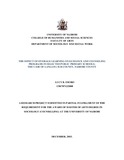| dc.contributor.author | Osoro, Lucy B | |
| dc.date.accessioned | 2016-04-27T11:13:30Z | |
| dc.date.available | 2016-04-27T11:13:30Z | |
| dc.date.issued | 2015 | |
| dc.identifier.uri | http://hdl.handle.net/11295/95142 | |
| dc.description.abstract | The introduction of Universal Primary Education in Kenya coupled with the existence of a large youthful population (42.2% of Kenya’s population aged below 13 years of age) has resulted in a drastic increase of mature entrée’s into primary level education and hence a divergent mix of learners. This means that many public primary schools are now enrolling older students at primary level in order to support acquisition of basic literacy and numeracy skills missed out in earlier formative years. The older learners are therefore inevitably interacting more often with younger learners on a day to day basis in class. Much scholarly work have enumerated clear benefits credited to intergenerational learning but have failed to provide insights on its impact on existing school-based guidance and counseling programs.
The study investigated the effect of overage learning on guidance and counseling initiatives in selected public primary schools within Lang’ata division, Nairobi, Kenya. Drawing from practical examples of intergenerational initiatives and programs around the world, the paper identifies benefits and challenges of synergistic efforts to create workable partnerships between the young and the old. The study was conducted in 7 purposively selected primary schools. Self-administered-structured questionnaires were used to collect primary data from 108 student respondents and 7 key informants (teacher counselors). Secondary data was collected from books, journals, official school and ministerial records and sound media reports/newspapers. Data was computed using the Statistical Package for Social Sciences (SPSS) and findings presented in numeral and non-numerical forms; tabular and percentages.
The study results indicate that despite great interaction among the young and older learners (86%) through giving of advice and undertaking joint school assignments, only 48% of older learners were engaged in school G/C. The study also found that 3 out of the 7 selected primary schools did not have trained guidance and counseling teachers, and even so among the schools with trained teachers were not able to undertake G/C programs because of the increased workload brought about by the number of students enrolling as a result of free primary education.
The study recommends the mainstreaming of and structured participation of older learners in guidance and counseling programs in primary schools. Policy makers should increase sector funding for G/C programs at primary school level so institute it as a full time office to support the growing number of students that need the support. It is anticipated that besides value-add to the empirical body of knowledge on the significance of intergenerational learning programs, the results from this study shall equip policy makers with much needed data and evidence to inform decision making at county and national level. It shall also furnish scholars in the social arena with information on existing research gaps that require support for further investigation | en_US |
| dc.language.iso | en | en_US |
| dc.publisher | University of Nairobi | en_US |
| dc.rights | Attribution-NonCommercial-NoDerivs 3.0 United States | * |
| dc.rights.uri | http://creativecommons.org/licenses/by-nc-nd/3.0/us/ | * |
| dc.subject | guidance and counseling programs, Public Primary Schools, Langata Sub-county | en_US |
| dc.title | The Effect of Overage Learning on Guidance and Counseling Programs in Selected Public Primary Schools; the Case of Langata Sub-county, Nairobi County | en_US |
| dc.type | Thesis | en_US |



